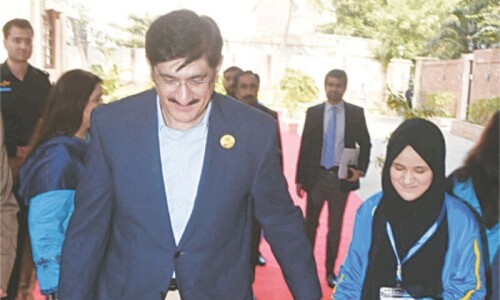• Evening programme’s Rs1.8bn used for leave encashment last year
• KU budget not placed before Senate for past six years
KARACHI: The ongoing crisis at Karachi University (KU) that has brought academic activities to a complete halt, leaving students in the lurch, has more to do with alleged mismanagement of funds than genuine financial problems, it emerged on Sunday.
Sources told Dawn the financial mismanagement and alleged irregularities were rooted in the university’s system that reportedly lacked transparency and accountability.
They said that it had been six years that the KU placed its annual budget for approval before the Senate, the statutory body to oversee such matters.
The sources said that the university’s annual budget was around Rs7bn, around half of which was managed through government funds and the rest with the help of students’ fees. A major chunk of the government funds came from the federal Higher Education Commission (HEC).
The university also announces a 10 per cent increase in students’ fee every year to cope with growing expenditures. And, while there wasn’t any increase in the HEC’s financial support, the provincial government’s funds had been increased from around Rs1.2bn last year to Rs4bn this year, the sources added.
They said the university also earned a substantial amount from its evening programme. Ran purely on a self-finance basis, the programme was currently the centre of conflict between the university administration and the teachers who hadn’t received their remuneration for the said programme since August last year.
Notwithstanding, they pointed out, the university administration paid Rs1.8bn from the evening programme’s funds to the staff on account of leave encashment last year.
“The staff should get leave encashment only after they are duly paid their remuneration and the administration has disbursed contingency funds to departments,” a retired KU teacher shared.
Past KU administrations, he pointed out, had often paid leave encashment amounts to employees from the evening programme’s funds, but only after paying staff their salaries and providing operational funds to departments.
“But, this is not being done. The worst sufferers, however, are students who are completely neglected and deprived of research and academic facilities at KU. Labs are without chemicals and students are often forced to buy chemicals from their own pockets,” he said, adding that there was no gas on the campus for three years now.
About the income the university generated from evening classes, senior teachers said that it’s a lucrative programme with one major problem.
“There are several instances where evening classes are initiated on internal or external pressures or influences without meeting the minimum criteria for students. Currently, out of the 30 plus departments running evening classes at KU, only 10 or 12 are making good profit,” a teacher said.
They, however, rejected the university administration’s claim that 70pc students were not paying their fees since the country had started experiencing economic hardships during and after the Covid-19 pandemic.
KU Vice Chancellor Dr Khalid Iraqi was not available for comments.
Speaking to Dawn, Karachi University Teachers’ Society (Kuts) president Prof Soleha Rahman questioned why administrative officials were getting full salaries if the university genuinely faced a financial crisis.
“All administrative officials including the vice chancellor, director finance, registrar, deans and department chairpersons as well as the non-teaching staff are getting their fixed monthly salaries. It’s only the teachers and the non-teaching lab staff who are suffering,” she added.
The funding of the federal HEC, she said, had nothing to do with the evening programme, which was a self-finance programme.
“If only 30pc of students are paying their fees, it’s the administration’s failure not ours,” she continued.
Sharing a similar opinion, Kuts Vice President Dr Syed Ghufran Alam said the administration had failed to properly manage KU resources and run the university.
“If this claim of 70pc reduction in students’ fee is accepted as true, the university officials should explain how they have been running the institution during these years and why they didn’t raise this issue on proper forums,” he said.
About payment of leave encashment, he said: “Financial management is not teachers’ job. The first responsibility of the administration is to pay teachers their due remuneration.”
Meanwhile, a delegation of Kuts led by Dr Faizan Naqvi and Dr Asad Tanoli met Jamaat-i-Islami leader Hafiz Naeemur Rehman at Idara Noor-i-Haq and apprised him of teachers’ grievances.
“Hafiz Naeem regretted the economic hardships KU teachers are facing and expressed solidarity with them. He was of the opinion that only a person appointed on merit could resolve KU’s problems,” said a press release.
Published in Dawn, September 25th, 2023















































Dear visitor, the comments section is undergoing an overhaul and will return soon.